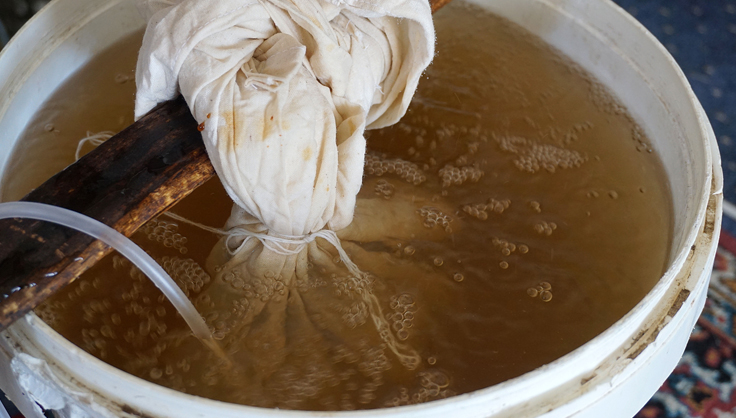How to Make Compost Tea

Is your garden in need of a mid-season pick-me-up? If so, it's time to brew up a batch of compost tea! This potent, microbial elixir will invigorate your garden with beneficial microbes that will reduce disease problems, ward off pests, and provide immediately available organic nutrients to boost plant vigor.
Compost tea is hardly a new idea. Generations of farmers and gardeners the world over already know the amazing power of compost tea. What's new and very exciting is scientific research that is proving just how incredible this home-brewed garden beverage really is.
Billions of beneficial microbes
Here's a mind-blowing statistic. Less than 1/4 teaspoon of good compost tea has been shown to contain over a billion bacteria—most of which are beneficial to plant growth. This same quarter-teaspoon may also contain over 16 feet of active fungal strands.
The beneficial bacteria in compost tea are good for your plants because they out-compete most disease-causing organisms. They also decompose toxic materials and plant residues and help build soil structure, which improves the soil's water-holding capacity. Fungi play a similar role in disease prevention, and they also retain nutrients, decompose plant material and build soil structure.
Good compost tea contains tens of thousands of different species of bacteria and fungi as well as protozoa, nematodes and mycorrhizal fungi. Scientists still haven't identify most of these species—they are just too numerous and too tiny to count. But new research is beginning to isolate task specific microbes that can be employed to break down oil spills, digest scrap wood, and control specific diseases such as botrytis, scab and mildew.
Someday soon it may be possible to purchase the exact type of compost tea needed to control black spot on roses or to convert dense clay soil into friable loam. But until then, compost tea of any flavor will do quite nicely. Not all of the bacteria and fungi you apply will be needed. But those that aren't will "sleep," staying in reserve until called upon by soil conditions or your plants.
How to Brew it Yourself
I usually make my tea out of well-rotted cow manure. But the best tea is made from compost. Compost contains a more complex array of microbes and nutrients. And compost that has heated up to 135 degrees for three days will also ensure that your tea is free of most disease-causing organisms. If you don't have your own supply of compost, you can use a good quality, commercially produced compost. In testing here at Gardener's Supply, we made an excellent batch of tea using the compost made at our community composting facility. If you use manure, make sure it has been composted because fresh manure can contain disease-causing organisms.
At home, I brew my tea in a 5-gallon bucket. I put in about a gallon of rotted manure and 4 gallons of water, stir well, and let the bucket sit near the garden for several days. It's important to stir the mixture gently several times a day to incorporate oxygen and help dislodge the microbes from the solid material. Without adequate oxygen, you may get a foul-smelling, anaerobic soup that can contain unfriendly bacteria. If your tea turns smelly, add some fresh water and stir more often. The aerobic bacteria will reestablish themselves as soon as there's an adequate supply of oxygen. To apply the tea, I just dilute it with water (in a watering can) at a rate of about 1 to 5. As you use the tea, top off the bucket with more water, and you can brew quite a few gallons before starting a fresh batch.
Professionally-brewed tea
Here's where the really exciting research is happening. It turns out that when compost tea is gently agitated and well oxygenated, you brew a super-charged tea that has 10 to 100 times more microbes in it. That means as much as 100 billion bacteria per quarter-teaspoon!
Much of this new research is being conducted by Dr. Elaine R. Ingham of Soil Foodweb, Inc. Their excellent publication, which I highly recommend, is called "The Compost Tea Brewing Manual." It compares several commercial tea makers, ranging from a "bio-blender" that can be used in a 5 gallon bucket, to 100 or 500 gallon brewers for farm or community use. Special recipes are provided for high bacteria, high fungal and high mycorrhizal teas, with troubleshooting information and recommended application rates.
Print this Article:
Get the Dirt
Stay up to date on new articles and advice. Please fill out the information below.
